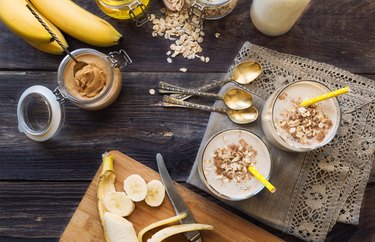Introduction
Understanding which foods make you gain weight is crucial for anyone looking to achieve their weight gain goals effectively. Gaining weight can be just as challenging as losing it, especially for individuals aiming to do so healthily and effectively. In this comprehensive guide, we’ll explore the crucial role of nutrition in weight gain and unveil the power of choosing the right foods to achieve your goals. Let’s embark on a journey to understand the science behind weight gain and uncover the secrets to successful and sustainable weight gain through food choices.
Understanding Weight Gain
By identifying which foods make you gain weight, you can tailor your diet to include more of these calorie-dense options. Weight gain goes beyond mere numbers on a scale; it’s intricately linked to overall health and well-being. Defined as the increase in body mass resulting from the accumulation of excess fat or muscle, weight gain can significantly impact one’s quality of life. Factors influencing weight gain include calorie intake, nutrient composition, and metabolic rate. By understanding these factors, individuals can make informed choices to support their weight gain journey while prioritizing health.
Optimal Weekly Weight Gain Goals
Are you aware of which foods make you gain weight the fastest? It’s essential to be mindful of these choices when striving for weight gain. Setting realistic and achievable weight gain goals is paramount for success. While the rate of weight gain varies from person to person, health experts generally recommend a gradual increase in body weight to ensure it’s primarily composed of lean muscle mass rather than fat. By striking a balance between calorie intake and expenditure, individuals can set optimal weekly weight gain goals that promote health and vitality.
The Secrets to Weight Gain
At the core of weight gain lies the science of calories, proteins, and fats. Calories serve as the fuel that powers our bodies, with proteins and fats playing essential roles in muscle building and overall metabolic function. Understanding how these nutrients work together to promote weight gain is key to making informed dietary choices. By unlocking the secrets to weight gain, individuals can harness the power of nutrition to achieve their desired outcomes.
The Ultimate Guide to Weight-Gaining Fruits
The nutrient composition of various foods can help determine which foods make you gain weight and which ones may not have the same effect. While fruits are typically associated with weight loss due to their high water and fiber content, certain fruits can actually aid in weight gain when consumed strategically. By selecting fruits with higher calorie and nutrient densities, individuals can enhance their calorie intake while reaping the nutritional benefits of these wholesome foods. From bananas to avocados, we’ll explore the ultimate guide to weight-gaining fruits that can fuel your journey to a healthier, more robust physique.
What Healthy Foods Make You Gain Weight?: A Comprehensive Approach
Healthy weight gain is not just about increasing numbers on a scale; it’s about nurturing your body from the inside out. By adopting a comprehensive approach that encompasses nutrition, exercise, sleep, and stress management, individuals can achieve sustainable weight gain while safeguarding their overall health. We’ll explore proven strategies for gaining weight healthily and provide practical tips for integrating these strategies into your daily routine.
Proven Strategies For What Foods Make You Gain Weight Fast?
For those seeking rapid results, several strategies can expedite the weight gain process without compromising health. From strategic meal planning to portion control and mindful eating, small adjustments to your dietary habits can yield significant gains in a short amount of time. By leveraging these proven strategies, individuals can accelerate their weight gain journey while laying the foundation for long-term success.
Mastering Weight Gain: The Top Healthful Food Choices
Mastering weight gain requires a careful selection of foods and dietary supplements that promote both physical and mental well-being. By prioritizing whole, nutrient-dense foods over processed options, individuals can nourish their bodies with the building blocks needed for optimal growth and development. From organic produce to high-quality proteins and fats, we’ll explore the top healthful food choices that can transform your weight gain journey.
Successful Weight Gain
Achieving successful weight gain is a journey that requires dedication, patience, and perseverance. By following a step-by-step guide tailored to your unique needs and preferences, you can navigate the challenges of weight gain with confidence and clarity. Whether you’re overcoming underweight issues or striving to build muscle mass, we’ll provide personalized recommendations to support your goals and empower you to achieve lasting success.
Which Foods Make You Gain Weight?: Top Food Recommendations
In closing, we’ve covered a wealth of information on gaining weight with the right foods. From understanding the science behind weight gain to unlocking the secrets of nutrition, you now have the knowledge and tools needed to embark on your own weight gain journey. By incorporating the top food recommendations outlined in this guide, you can fuel your body for success and achieve the healthy, vibrant life you deserve. When it comes to weight gain, being conscious of foods that make you gain weight when eaten at night can help optimize your dietary choices throughout the day. Gaining weight healthfully requires a strategic approach to food choices. Here’s a breakdown of each heading to better understand which foods make you gain weight:
Homemade Protein Smoothies:
Protein smoothies provide a convenient and customizable way to increase your protein intake, essential for muscle growth and repair. By incorporating ingredients like fruits, vegetables, protein powder, and healthy fats, you can create nutrient-dense smoothies tailored to your taste and weight gain goals.
Dairy Milk:
Dairy milk is rich in protein, calcium, and essential vitamins, making it an excellent choice for supporting muscle growth and overall health. It’s a calorie-dense beverage that can easily be incorporated into your diet by drinking it plain, adding it to smoothies, or using it as a base for soups and sauces.
Rice:
Rice is a staple carbohydrate source that provides a high amount of energy per serving. It’s easy to digest and can be paired with protein and vegetables to create balanced meals that support weight gain. Opt for varieties like brown or jasmine rice for added nutritional benefits.
Nuts and Nut Butter:
Nuts and nut butter are calorie-dense foods packed with healthy fats, protein, and fiber. They make convenient snacks or additions to meals, providing sustained energy and promoting satiety. Be mindful of portion sizes as they are calorie-dense and can contribute to weight gain if consumed in excess.
Red Meats:
Red meats like beef and lamb are rich sources of protein, iron, zinc, and B vitamins, all of which are essential for muscle growth and overall health. Incorporating lean cuts of red meat into your diet can help increase calorie intake and support weight gain when consumed as part of a balanced diet.
Potatoes:
Potatoes and other complex carbohydrates like sweet potatoes, oats, and whole grains provide a steady source of energy and are ideal for promoting weight gain. They’re versatile ingredients that can be included in various meals and snacks to increase calorie intake.
Oily Fish:
Salmon and oily fish are excellent sources of protein and omega-3 fatty acids, which support muscle growth, heart health, and overall well-being. Including these nutrient-rich foods in your diet can help boost calorie intake while providing numerous health benefits.
Protein Supplements:
Protein supplements such as whey protein powder or plant-based protein powders are convenient options for increasing protein intake, especially for those with higher protein needs or busy lifestyles. They can be easily added to smoothies, oatmeal, or yogurt to enhance calorie and protein content.
Dried Fruit:
Dried fruits like raisins, dates, and apricots are concentrated sources of calories, carbohydrates, and fiber. They make convenient snacks or additions to meals, providing quick energy and essential nutrients for weight gain.
Whole Grain Bread:
Whole grain bread is a nutritious carbohydrate source that provides sustained energy and essential nutrients like fiber, vitamins, and minerals. Choosing whole grain varieties over refined options can support weight gain and overall health.
Cereals:
Cereals are often fortified with vitamins and minerals and can be a convenient way to increase calorie intake, especially when paired with milk or yogurt. Opt for whole grain or high-fiber varieties for added nutritional benefits.
Dark Chocolate:
Dark chocolate is a decadent treat that also offers health benefits when consumed in moderation. It’s rich in antioxidants, fiber, and minerals like iron and magnesium, making it a satisfying addition to a weight-gain diet.
Cheese:
Cheese is a concentrated source of calories, protein, calcium, and fat, making it an excellent choice for supporting weight gain and bone health. It can be enjoyed on its own, added to meals, or paired with fruits and nuts for a balanced snack.
Whole Eggs:
Whole eggs are nutrient powerhouses, providing high-quality protein, healthy fats, vitamins, and minerals. They’re versatile ingredients that can be cooked in various ways to enhance meals and increase calorie intake.
Yogurts:
Yogurts made with whole milk are rich in protein, calcium, and probiotics, which support muscle growth, bone health, and gut function. Including them in your diet can help increase calorie intake while providing essential nutrients.
Fats and Oils:
Healthy fats and oils like olive oil, coconut oil, and avocado oil are calorie-dense and provide essential fatty acids that are crucial for overall health. Adding them to meals or using them in cooking can increase calorie intake and support weight gain when consumed in moderation.
Conclusion
When it comes to weight gain, being conscious of which foods make you gain weight when eaten at night can help optimize your dietary choices throughout the day.In conclusion, gaining weight with the right foods is not only achievable but also essential for promoting overall health and well-being. By making informed dietary choices and adopting a comprehensive approach to weight gain, you can transform your body and your life. It’s essential to understand that while some foods are associated with weight gain, there are also options that what foods dont make you gain weight. Remember, success takes time and effort, but with dedication and perseverance, you can achieve your goals and unlock your full potential. Here’s to a healthier, happier you!
Frequently Asked Questions and Answers
Q1. Is there a blood test for weight gain?
No, there is currently no specific blood test solely for determining weight gain. However, blood tests can provide valuable insights into factors such as hormone levels, metabolism, and nutrient deficiencies, which can indirectly impact weight gain.
Q2. How do you know what foods make you gain weight?
Understanding what foods make you gain weight involves a combination of factors such as monitoring your calorie intake, assessing the nutritional content of the foods you consume, and observing how your body responds to different types of foods over time.
Q3. What foods make you gain weight the fastest?
There isn’t a single “best” test for determining weight gain as it depends on various factors such as individual health status, goals, and preferences.
Q4. Can a blood test to see what foods make you gain weight?
While a blood test alone cannot determine the specific foods you should eat for weight gain, it can offer insights into your overall health status and potential nutritional deficiencies.







Leave a Reply